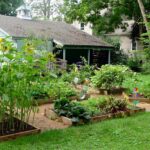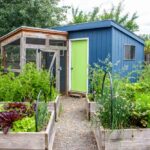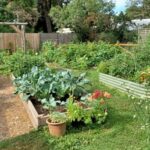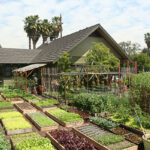In today’s fast-paced world, many individuals are turning to homesteading as a means to reconnect with nature, gain self-sufficiency, and lead a more sustainable lifestyle. While the concept might seem daunting at first, there are many easy homestead skills to learn that can make the transition smoother. Whether you are a beginner or an enthusiast, these skills will not only enrich your life but also empower you to create a thriving homestead.
Homesteading isn’t just about growing your own food or raising livestock. It involves a comprehensive understanding of sustainable living practices, including waste reduction and natural resource management. Fortunately, there are numerous easy homestead skills to learn that are crucial for beginners and seasoned homesteaders alike. Let’s dive into these skills and explore how they can be seamlessly integrated into your daily life.

Understanding the Basics of Gardening
Starting a garden is often the first step in homesteading. It is an essential skill that forms the backbone of any homestead. Whether you have a small backyard or a sprawling acreage, understanding the basics of gardening can help you cultivate a wide range of fruits and vegetables. You can learn about mulching techniques to maintain soil moisture and improve plant health.
Choosing the Right Plants
One of the easy homestead skills to learn is selecting the right plants for your garden. Consider factors such as climate, soil type, and sunlight availability. Opt for native plants that are well-suited to your region as they require less maintenance and are more resilient to local pests and diseases.
Soil Management
Healthy soil is the foundation of a successful garden. Learn how to test your soil’s pH and nutrient levels to ensure optimal plant growth. Incorporate organic matter such as compost and manure to improve soil fertility and structure. For more tips, check out this guide on erosion control.
Raising Small Livestock
Raising small livestock is another rewarding homestead skill. Chickens, ducks, and rabbits are popular choices for beginners due to their manageable size and relatively low maintenance. These animals provide a sustainable source of eggs, meat, and manure for your garden.
Poultry Care
Chickens are a fantastic addition to any homestead. They are easy to care for and can produce a steady supply of fresh eggs. Learn about their feeding, housing, and health care needs to ensure a happy and productive flock.
Rabbit Rearing
Rabbits are another great option for small-scale livestock. They reproduce quickly and can be a reliable source of meat. Additionally, their droppings make excellent fertilizer for your garden.
Preserving Food
Food preservation is a vital skill for homesteaders. It allows you to extend the shelf life of your harvest and enjoy homegrown produce year-round. Some easy food preservation methods include canning, freezing, and drying.
Canning Basics
Canning is a popular method for preserving fruits, vegetables, and meats. It involves sealing food in jars and heating them to destroy harmful bacteria. Learn the basics of water bath canning and pressure canning to safely preserve your harvest.
Dehydrating Fruits and Vegetables
Dehydrating is a simple way to preserve food without the need for refrigeration. Invest in a quality dehydrator to dry fruits, vegetables, and herbs. This method retains nutrients and flavor, making it an excellent option for long-term storage.
Building Basic Structures
Homesteading often involves building and maintaining structures on your property. Whether it’s a chicken coop, a greenhouse, or a storage shed, learning basic carpentry skills can save you time and money. Start with simple projects and gradually work your way up to more complex builds.
Tool Familiarity
Familiarize yourself with essential tools such as hammers, saws, and drills. Practice using these tools safely and effectively to gain confidence in your building abilities.
Construction Techniques
Learn basic construction techniques such as measuring, cutting, and assembling materials. Online tutorials and workshops can provide valuable insights and guidance for your projects.
Reducing Waste
Waste reduction is a crucial aspect of sustainable living. Implementing simple practices can help minimize your environmental impact and save money. Learn more about reducing waste on your homestead.
Composting
Composting is an eco-friendly way to recycle organic waste. Create a compost pile or bin to turn kitchen scraps and yard waste into nutrient-rich soil for your garden.
Recycling and Repurposing
Embrace the mindset of recycling and repurposing items whenever possible. Transform old furniture, containers, and materials into functional and decorative pieces for your homestead.
Engaging with the Homesteading Community
Connecting with other homesteaders can be incredibly rewarding. Join online forums, attend workshops, and participate in local events to share knowledge and experiences. Consider listening to podcasts on homesteading topics for inspiration and tips.
Learning from Others
Engage with experienced homesteaders to learn from their successes and challenges. They can offer valuable advice and support as you embark on your homesteading journey.
Sharing Your Journey
Document and share your homesteading journey through blogs, social media, or community groups. Your experiences can inspire and educate others who are interested in pursuing a similar lifestyle.

FAQs
What are some easy homestead skills to learn for beginners?
Beginners can start with gardening, raising small livestock, food preservation, and basic construction. These skills provide a solid foundation for a self-sufficient lifestyle.
How can I start a garden on my homestead?
Begin by choosing the right plants for your climate and soil. Prepare your garden bed, maintain healthy soil, and implement mulching techniques to promote plant growth.
What are the benefits of preserving food on a homestead?
Preserving food allows you to enjoy your harvest year-round, reduce waste, and save money. Methods like canning, freezing, and dehydrating retain nutrients and flavor.
For additional insights on homesteading, visit this beginner’s guide to homesteading.





